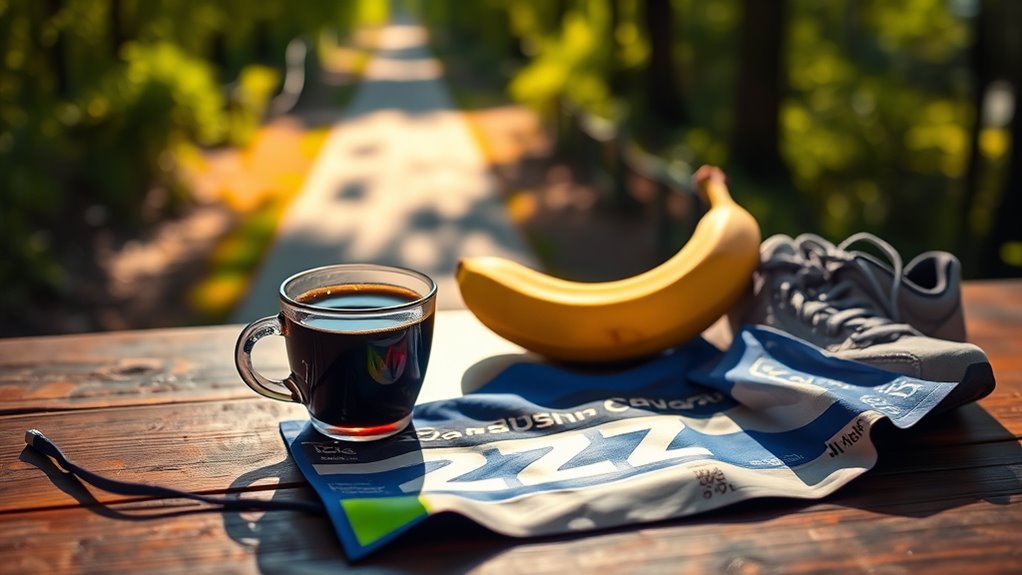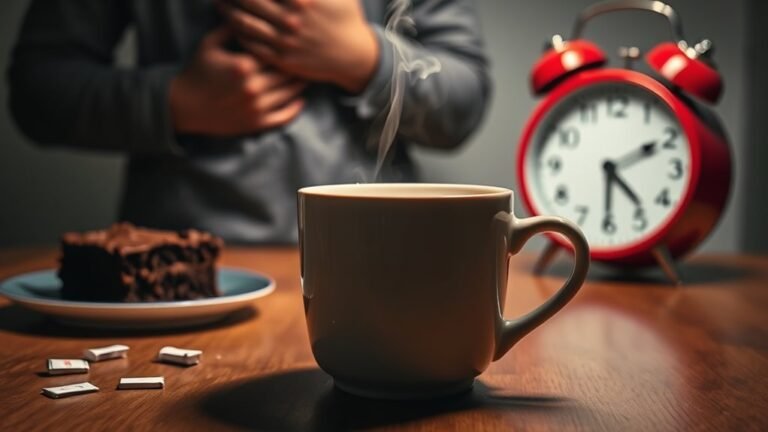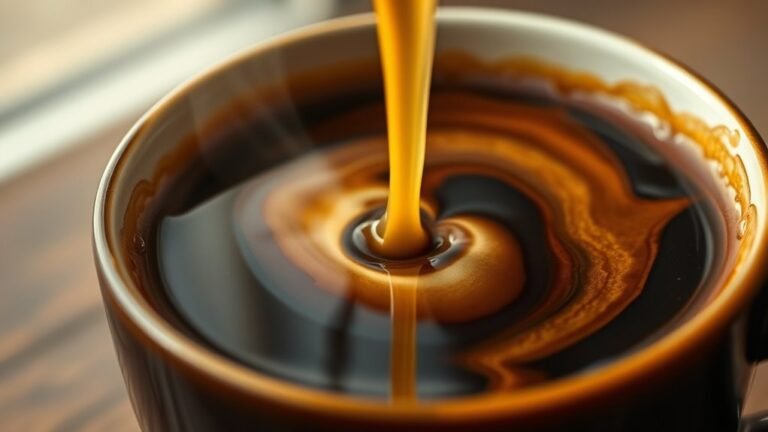The Benefits of Coffee for Marathon Runners
Coffee can notably enhance your marathon performance by boosting endurance and reducing perceived fatigue. It improves fat oxidation and sharpens mental focus, helping you stay alert throughout your run. Consuming caffeine 30-60 minutes before a race can lead to faster times and quicker recovery. However, it’s essential to balance coffee with hydration to avoid dehydration. To maximize its benefits, consider personalizing your intake based on your training experiences. Discover more about optimizing your coffee consumption for performance.
The Science Behind Caffeine and Endurance

When you’re gearing up for a marathon, understanding how caffeine affects your performance can be essential. Caffeine’s role in caffeine metabolism can boost your endurance by enhancing fat oxidation, allowing your body to conserve glycogen stores. This process supports endurance adaptations, enabling you to sustain effort over longer distances without fatigue. Studies show that caffeine can improve your time-to-exhaustion, making it a powerful ally during training and races. By regularly incorporating caffeine into your pre-run routine, you might experience adaptations that enhance your overall stamina. Just remember, everyone’s response to caffeine varies; experimenting with different amounts will help you find what works best for you. With the right approach, caffeine can become a valuable part of your marathon preparation.
Enhanced Performance During Long Runs
Although many factors contribute to a runner’s performance, incorporating coffee into your routine can greatly enhance your experience during long runs. Here’s how you can optimize your running strategy with the right caffeine dosage:
Incorporating coffee into your running routine can significantly enhance your performance and overall experience during long runs.
- Improved Endurance: Caffeine can boost your endurance by increasing fat oxidation.
- Enhanced Focus: It sharpens mental clarity, helping you stay motivated during those tough miles.
- Increased Speed: A moderate caffeine intake can lead to faster race times, allowing you to push your limits.
- Better Recovery: Post-run coffee may help reduce muscle soreness, making your next workout feel easier.
Reduced Perceived Effort and Fatigue

In addition to enhancing performance, coffee can greatly impact how you perceive effort and fatigue during your runs. Research shows that caffeine can lower your perception of exertion, making it easier to push through long distances. However, individual variability in caffeine tolerance means that effects can differ from person to person.
Here’s a quick overview:
| Caffeine Amount | Perceived Effort Level | Potential Benefits |
|---|---|---|
| Low (1-2 cups) | Moderate | Mild fatigue reduction |
| Moderate (3-4 cups) | Low | Improved endurance |
| High (5+ cups) | Very Low | Enhanced performance |
Understanding your own tolerance can help you find the right balance to maximize these benefits, giving you the freedom to enjoy your runs even more.
Improved Mental Focus and Concentration
When you’re running a marathon, maintaining mental focus is just as essential as physical endurance. Research shows that caffeine can enhance cognitive performance, helping you stay sharp and alert throughout the race. This boost in concentration may also reduce your perception of effort, allowing you to push through those challenging moments.
Enhanced Cognitive Performance
As you prepare for a marathon, boosting your mental focus and concentration can be just as important as physical training, and coffee can play a significant role in this enhancement. The cognitive benefits of coffee can help you achieve greater mental clarity during your runs. Here are some ways coffee can enhance your cognitive performance:
- Increased Alertness: Caffeine stimulates the central nervous system, keeping you awake and attentive.
- Improved Reaction Time: Coffee can enhance your ability to respond quickly, which is essential for maneuvering race conditions.
- Enhanced Problem-Solving: It helps sharpen your decision-making skills, critical for pacing and strategy.
- Greater Endurance: A focused mind can push you to maintain your pace longer, maximizing your performance.
Embrace coffee for that edge on race day!
Reduced Perceived Effort
While tackling a marathon, you might find that coffee not only boosts your physical performance but also reduces the perceived effort of your run. Caffeine has been shown to enhance the brain’s ability to focus, making those grueling miles feel less intimidating. By increasing your adrenaline levels, it can trick your mind into feeling less fatigued. However, it’s important to evaluate your caffeine sensitivity and individual tolerance; what works wonders for one runner might disrupt another. Experimenting with coffee during training can help you determine the best amount for race day. Ultimately, when used wisely, coffee can transform your mental state, allowing you to push through fatigue and maintain concentration, making your marathon experience more enjoyable.
Optimal Timing for Coffee Consumption

When it comes to coffee consumption for marathon running, timing is essential. You’ll want to consume coffee about 30 to 60 minutes before the race to maximize its benefits on performance and endurance. Additionally, consider sipping on coffee during the race if you need an extra boost, but be mindful of how it affects your hydration.
Pre-Race Timing
To maximize the benefits of coffee before a marathon, timing your consumption is essential. Your pre-race rituals can greatly impact your performance, so consider the following guidelines based on individual tolerance:
- 30-60 Minutes Pre-Race: Aim to drink coffee about 30 to 60 minutes before the start. This timing allows caffeine to peak in your bloodstream when you need it most.
- Personalize Your Intake: Test different amounts during training to find what works best for you.
- Stay Hydrated: Balance caffeine intake with water to avoid dehydration.
- Avoid Overconsumption: Too much caffeine can lead to jitters or upset stomach, so listen to your body.
During the Race
As you navigate the course of a marathon, knowing the ideal timing for coffee consumption can enhance your endurance and performance. Research indicates that consuming coffee about 30-60 minutes before your race will optimize caffeine metabolism, ensuring you reap its benefits. However, during the race, consider your individual tolerance and hydration levels. If you’re accustomed to caffeine during training, a mid-race boost—around the halfway point—can help maintain energy. This aligns with effective race strategies, allowing you to counter fatigue when it strikes. Remember, it’s essential to test your coffee timing in training runs to see how your body responds. This way, you can confidently harness coffee’s potential for your marathon success.
The Role of Hydration in Caffeine Use
Although caffeine can enhance performance for marathon runners, understanding its relationship with hydration is essential. Striking the right caffeine balance while staying hydrated can greatly impact your race. Here are some hydration strategies to evaluate:
- Pre-Race: Drink water and electrolyte-rich fluids in the hours leading up to your run.
- During the Race: Alternate between caffeinated drinks and water to maintain hydration levels.
- Post-Race: Replenish lost fluids with a mix of water and electrolyte beverages, especially if you consumed caffeine.
- Monitor Signs: Pay attention to your body; fatigue or dizziness can indicate dehydration, even with caffeine in your system.
Potential Drawbacks and Considerations

While caffeine can provide performance benefits for marathon runners, it’s important to contemplate its potential drawbacks. One major concern is caffeine sensitivity, which varies from person to person. If you’re sensitive, even a small amount can lead to jitters, increased heart rate, or digestive issues. It’s essential to understand your individual tolerance before incorporating coffee into your pre-race routine. Additionally, excessive caffeine can disrupt sleep patterns, which is critical for recovery. It may also lead to dehydration if not balanced with sufficient water intake. Always consider how caffeine interacts with your body, and adjust your consumption accordingly. Being mindful of these factors can help you make informed choices that optimize your performance while minimizing potential downsides.
Real-Life Success Stories From Runners
Many runners have found that incorporating coffee into their training and race-day routines has led to significant improvements in their performance. Here are some runner testimonials highlighting personal experiences with coffee:
- Increased Endurance: Many runners report longer runs without fatigue after consuming coffee before training.
- Enhanced Focus: Coffee helps sharpen mental clarity, keeping runners alert and motivated.
- Improved Recovery: Post-run coffee consumption has been linked to reduced muscle soreness, aiding quicker recovery.
- Boosted Speed: Several athletes claim a noticeable uptick in pace during races after using coffee as a pre-run stimulant.
From these experiences, it’s clear that coffee can be a practical ally for runners seeking that extra edge in their performance.
Frequently Asked Questions
Can Coffee Consumption Affect Sleep Patterns in Runners?
Yes, coffee consumption can definitely affect your sleep patterns. If you’re drinking coffee too close to bedtime, it may lead to poorer sleep quality due to caffeine’s stimulating effects. Timing is essential; try to enjoy your last cup at least six hours before you hit the sack. This way, you can enjoy the benefits of coffee without sacrificing restful sleep, helping you feel more refreshed and ready for your next run.
Is Decaf Coffee Beneficial for Marathon Runners?
Decaf coffee can offer some decaf advantages for marathon runners. While it lacks the caffeine’s immediate performance enhancement, it still contains antioxidants and nutrients that may support overall health. Drinking decaf may help you stay hydrated and provide a comforting ritual without affecting your sleep patterns. If you’re looking for a way to enjoy coffee without the jitters, decaf can be a practical choice while still receiving some benefits for your training.
How Much Caffeine Is Too Much for Athletes?
When it comes to caffeine, you’ll want to find the sweet spot for ideal dosage. Generally, athletes can safely consume about 3-6 mg of caffeine per kilogram of body weight. However, individual caffeine tolerance varies, so listen to your body. Too much caffeine can lead to jitters, anxiety, and even performance dips. Finding your balance is key to reaping the benefits without crossing the line into excess.
Do All Coffee Types Provide the Same Benefits?
Did you know that a study found espresso can have up to 30% more caffeine than regular brewed coffee? While all coffee types offer caffeine, their benefits can vary. Espresso’s concentrated form can enhance alertness quicker, while cold brew tends to be smoother and less acidic, making it easier on your stomach. Ultimately, the best choice depends on your taste preferences and how your body responds to different coffee types.
Can Coffee Help With Recovery After a Marathon?
Yes, coffee can aid your recovery after a marathon. It helps replenish glycogen stores and may reduce muscle soreness, making it a practical addition to your recovery strategies. Just remember to maintain your hydration balance; coffee is a diuretic, so pair it with plenty of water. By incorporating coffee thoughtfully, you can enhance your recovery process, helping you feel more energetic and ready for your next challenge.






